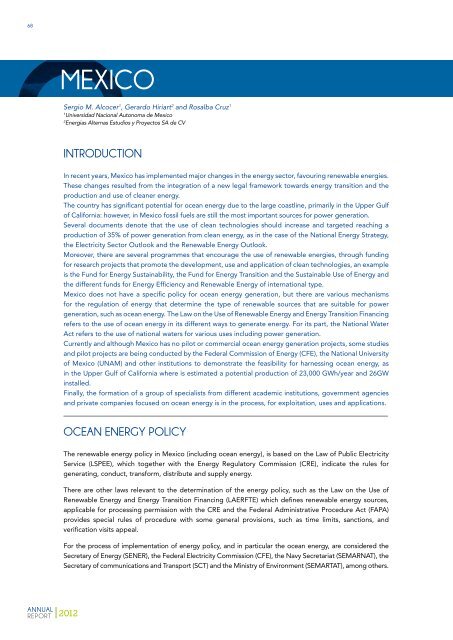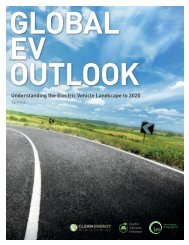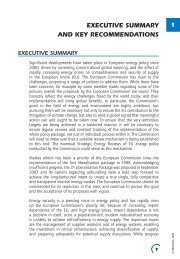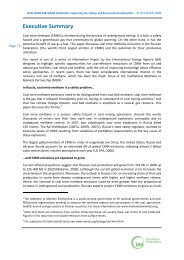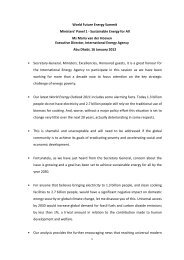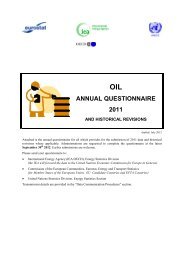OES Annual Report 2012 - Ocean Energy Systems
OES Annual Report 2012 - Ocean Energy Systems
OES Annual Report 2012 - Ocean Energy Systems
Create successful ePaper yourself
Turn your PDF publications into a flip-book with our unique Google optimized e-Paper software.
68<br />
MEXICO<br />
Sergio M. Alcocer 1 , Gerardo Hiriart 2 and Rosalba Cruz 1<br />
1<br />
Universidad Nacional Autonoma de Mexico<br />
2<br />
Energias Alternas Estudios y Proyectos SA de CV<br />
INTRODUCTION<br />
In recent years, Mexico has implemented major changes in the energy sector, favouring renewable energies.<br />
These changes resulted from the integration of a new legal framework towards energy transition and the<br />
production and use of cleaner energy.<br />
The country has significant potential for ocean energy due to the large coastline, primarily in the Upper Gulf<br />
of California: however, in Mexico fossil fuels are still the most important sources for power generation.<br />
Several documents denote that the use of clean technologies should increase and targeted reaching a<br />
production of 35% of power generation from clean energy, as in the case of the National <strong>Energy</strong> Strategy,<br />
the Electricity Sector Outlook and the Renewable <strong>Energy</strong> Outlook.<br />
Moreover, there are several programmes that encourage the use of renewable energies, through funding<br />
for research projects that promote the development, use and application of clean technologies, an example<br />
is the Fund for <strong>Energy</strong> Sustainability, the Fund for <strong>Energy</strong> Transition and the Sustainable Use of <strong>Energy</strong> and<br />
the different funds for <strong>Energy</strong> Efficiency and Renewable <strong>Energy</strong> of international type.<br />
Mexico does not have a specific policy for ocean energy generation, but there are various mechanisms<br />
for the regulation of energy that determine the type of renewable sources that are suitable for power<br />
generation, such as ocean energy. The Law on the Use of Renewable <strong>Energy</strong> and <strong>Energy</strong> Transition Financing<br />
refers to the use of ocean energy in its different ways to generate energy. For its part, the National Water<br />
Act refers to the use of national waters for various uses including power generation.<br />
Currently and although Mexico has no pilot or commercial ocean energy generation projects, some studies<br />
and pilot projects are being conducted by the Federal Commission of <strong>Energy</strong> (CFE), the National University<br />
of Mexico (UNAM) and other institutions to demonstrate the feasibility for harnessing ocean energy, as<br />
in the Upper Gulf of California where is estimated a potential production of 23,000 GWh/year and 26GW<br />
installed.<br />
Finally, the formation of a group of specialists from different academic institutions, government agencies<br />
and private companies focused on ocean energy is in the process, for exploitation, uses and applications.<br />
OCEAN ENERGY POLICY<br />
The renewable energy policy in Mexico (including ocean energy), is based on the Law of Public Electricity<br />
Service (LSPEE), which together with the <strong>Energy</strong> Regulatory Commission (CRE), indicate the rules for<br />
generating, conduct, transform, distribute and supply energy.<br />
There are other laws relevant to the determination of the energy policy, such as the Law on the Use of<br />
Renewable <strong>Energy</strong> and <strong>Energy</strong> Transition Financing (LAERFTE) which defines renewable energy sources,<br />
applicable for processing permission with the CRE and the Federal Administrative Procedure Act (FAPA)<br />
provides special rules of procedure with some general provisions, such as time limits, sanctions, and<br />
verification visits appeal.<br />
For the process of implementation of energy policy, and in particular the ocean energy, are considered the<br />
Secretary of <strong>Energy</strong> (SENER), the Federal Electricity Commission (CFE), the Navy Secretariat (SEMARNAT), the<br />
Secretary of communications and Transport (SCT) and the Ministry of Environment (SEMARTAT), among others.<br />
ANNUAL<br />
REPORT <strong>2012</strong>


